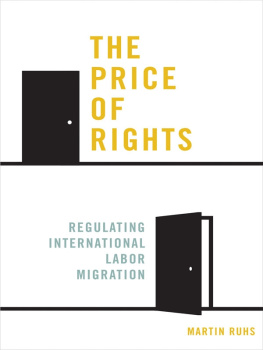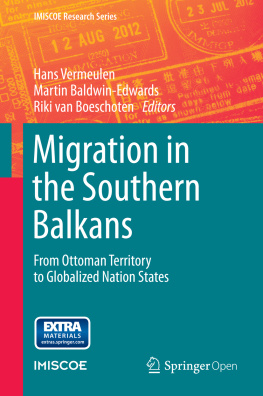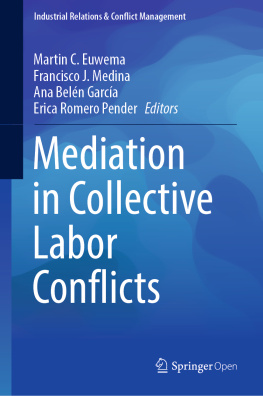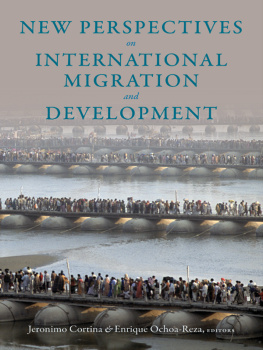Martin Ruhs - The Price of Rights: Regulating International Labor Migration
Here you can read online Martin Ruhs - The Price of Rights: Regulating International Labor Migration full text of the book (entire story) in english for free. Download pdf and epub, get meaning, cover and reviews about this ebook. year: 2015, publisher: Princeton University Press, genre: Science. Description of the work, (preface) as well as reviews are available. Best literature library LitArk.com created for fans of good reading and offers a wide selection of genres:
Romance novel
Science fiction
Adventure
Detective
Science
History
Home and family
Prose
Art
Politics
Computer
Non-fiction
Religion
Business
Children
Humor
Choose a favorite category and find really read worthwhile books. Enjoy immersion in the world of imagination, feel the emotions of the characters or learn something new for yourself, make an fascinating discovery.
- Book:The Price of Rights: Regulating International Labor Migration
- Author:
- Publisher:Princeton University Press
- Genre:
- Year:2015
- Rating:4 / 5
- Favourites:Add to favourites
- Your mark:
- 80
- 1
- 2
- 3
- 4
- 5
The Price of Rights: Regulating International Labor Migration: summary, description and annotation
We offer to read an annotation, description, summary or preface (depends on what the author of the book "The Price of Rights: Regulating International Labor Migration" wrote himself). If you haven't found the necessary information about the book — write in the comments, we will try to find it.
Martin Ruhs: author's other books
Who wrote The Price of Rights: Regulating International Labor Migration? Find out the surname, the name of the author of the book and a list of all author's works by series.
The Price of Rights: Regulating International Labor Migration — read online for free the complete book (whole text) full work
Below is the text of the book, divided by pages. System saving the place of the last page read, allows you to conveniently read the book "The Price of Rights: Regulating International Labor Migration" online for free, without having to search again every time where you left off. Put a bookmark, and you can go to the page where you finished reading at any time.
Font size:
Interval:
Bookmark:
THE PRICE OF RIGHTS
THE PRICE OF RIGHTS
REGULATING INTERNATIONAL LABOR MIGRATION
MARTIN RUHS
Princeton University Press
Princeton and Oxford
Copyright 2013 by Princeton University Press
Published by Princeton University Press,
41 William Street, Princeton, New Jersey 08540
In the United Kingdom: Princeton University Press,
6 Oxford Street, Woodstock, Oxfordshire OX20 1TW
press.princeton.edu
All Rights Reserved
Library of Congress Cataloging-in-Publication Data
Ruhs, Martin.
The price of rights : regulating international labor migration / Martin Ruhs.
pages cm
Includes bibliographical references and index.
ISBN 978-0-691-13291-4 (hardcover : alk. paper) 1. Foreign workersCivil rights. 2. Foreign workersLegal status, laws, etc. 3. Labor laws and legislation. 4. Human rights. 5. Emigration and immigrationEconomic aspects. 6. Emigration and immigrationGovernment policy. 7. Emigration and immigration law. I. Title.
HD6300.R84 2013
331.62dc23 2013006552
British Library Cataloging-in-Publication Data is available
This book has been composed in Trade Gothic LT STD and Sabon LT STD
Printed on acid-free paper.
Printed in the United States of America
10 9 8 7 6 5 4 3 2 1
Acknowledgments
Writing this book turned out to be a much more ambitious and demanding project than I initially anticipated. Straddling economics, politics, and law, the book aims to be global in its reach, and hopes to engage academic researchers as well as a policy audience with an interest in international labor migration and the rights of migrant workers. One of my main argumentsthat there can be a tension between promoting more international labor migration and more rights for migrant workershas proven controversial, especially outside academia, but I think it is a key issue that needs to be better analyzed and more openly debated than has been the case so far. The book should be read as a contribution to analysis and debate about an underresearched and underdebated topic of critical importance. I hope it will lead to more research and discussions.
I owe a huge debt of gratitude to a large number of people who, in many different ways, have helped me develop my analysis and arguments over the past few years. It is impossible to thank them all, and I apologize in advance if I have accidentally forgotten anybody.
My interest in the tension between openness and rights.
Philip Martin has been a key influence on my work on international labor migration. The analysis in this book builds on joint work with Phil, especially our paper Numbers vs. Rights: Trade-offs and Guest Worker Programs, published in the journal International Migration Review in 2008. I am grateful to Phil for the many discussions about the issues in this book, for his comments on most of the draft chapters, and his encouragement and support.
Bridget Anderson, my coauthor for many years, has had a huge influence on my work and this book, although she may not immediately recognize it. Bridget and I continue to argue over definitions and the role of the state in regulating labor immigration and labor marketsand I have a feeling we wont agree anytime soon!
A big thank you also to David Keen, who has encouraged and supported me in writing this book. I have greatly benefited from his comments, and all our discussions of my half-baked ideas and contentions. A big reason why this book ever got completed was that I finally accepted Davids argument that books generally get abandoned, not finished.
I have had the good fortune of working with a team of truly outstanding research assistants. The empirical analysis in , and helped me complete the manuscript during the last six months of the process.
I would also like to thank the many friends and colleagues who have provided comments and critiques of my developing arguments and draft chapters. Robin Cohen, Cathryn Costello, Matthew Gibney,Sarah Spencer, and Mimi Zou have helped me better understand some of the key legal and normative issues discussed in this book. Scott Blinder, Alan Gamlen, Michael Keith, Lindsay Lowell, Cinzia Rienzo, Alisdair Rogers, Nick van Hear, Carlos Vargas-Silva, and Jonathan Wadsworth have all provided useful comments on my empirical analysis. Ryszard Cholewinski and Pia Oberoi offered critical and extremely helpful comments on my discussion of the human rights of migrants along with the roles of the ILO and the Office for the High Commissioner for Human Rights (OHCHR). Samuel Engblom aided me in better understanding Swedens recently emerged exceptionalism in labor immigration policy.
Oxford Universitys Centre on Migration, Policy, and Society has provided a highly stimulating research environment for writing this book. I am grateful to all my colleagues there for their feedback, critical conversations, and support over the years.
At Princeton University Press, I would like to thank Richard Baggaley, who was my editor during the first few years of this book project, for his encouragement and comments on early draft chapters. I am also grateful to Seth Ditchik, my editor when I completed the book, for his patience and continuing support despite my delivery behind schedule. Thank you also to Cindy Milstein, my copy editor, and Natalie Baan, my production editor, for helping bring the project to a conclusion.
There were many points over the past few years when I was not sure whether I would ever be able to complete this book. I could not have done it without the constant support and encouragement of my family and friends. Thank you for keeping the faith in what must have appeared as an endless, somewhat-mysterious book project. I am especially grateful to my father, Sepp; Rose, Joe, and all the foxes; and Emma, Pauline, and Vivian.
My biggest thanks go to my wife, Clare, for her love, support, and endurance of all the ups and (many more) downs of writing this book. In addition to tolerating my (occasional!) absentmindedness, she has patiently and critically discussed all the ideas and arguments in this book, many times over. I could not have written this book without Clare. Thank you for everything.
When I was halfway through writing this book, my daughter, Emily, bounced into our lives. She is still too young to understand why exactly I had to spend all those evenings and nights staring at books and computer screens. But she was a constant source of happiness that kept me going.
This book is dedicated to Clare and Emily.
Abbreviations
CMW | International Convention on the Protection of the Rights of All Migrant Workers and Members of Their Families |
ECHR | European Court of Human Rights |
EEA | European Economic Area |
GATS | General Agreement on Trade in Services |
GCC | Gulf Cooperation Council |
GFMD | Global Forum on Migration and Development |
GNI | Gross National Income |
ILO | International Labour Organization |
IOM | International Organization for Migration |
MAC | Migration Advisory Committee |
MIPEX | Migrant Integration Policy Index |
NGO | Nongovernmental Organization |
OECD | Organisation for Economic Co-operation and Development |
OHCHR | Office of the High Commissioner for Human Rights |
POEA | Philippine Overseas Employment Administration |
Font size:
Interval:
Bookmark:
Similar books «The Price of Rights: Regulating International Labor Migration»
Look at similar books to The Price of Rights: Regulating International Labor Migration. We have selected literature similar in name and meaning in the hope of providing readers with more options to find new, interesting, not yet read works.
Discussion, reviews of the book The Price of Rights: Regulating International Labor Migration and just readers' own opinions. Leave your comments, write what you think about the work, its meaning or the main characters. Specify what exactly you liked and what you didn't like, and why you think so.








